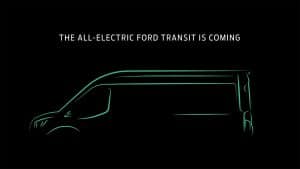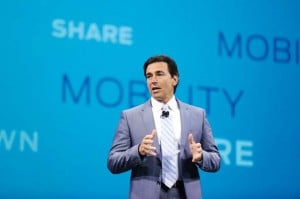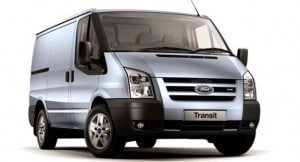
Ford expects to have the all-electric version of its big Transit van in production by the 2022 model-year.
(This story has been updated to reflect the fact Ford will do the Transit’s development entirely in-house.)
Ford Motor Co. has confirmed that it will add an all-electric version of its big delivery van, the Transit, starting in the 2022 model-year.
It will join an expanding line-up of all-electric models from the second-largest Detroit automaker, including the Ford Mustang Mach-E and all-electric version of the F-150 pickup. Ford had previously offered a plug-in hybrid Transit in some markets and originally signaled it would have a long-range, battery-powered version of the van ready by 2020.
“Commercial vehicles are a critical component to our big bet on electrification,” said Ford Chief Operating Officer Jim Farley. “As leaders in this space, we are accelerating our plans to create solutions that help businesses run better, starting with our all-electric Transit and F-150. This Ford Transit isn’t just about creating an electric drivetrain, it’s about designing and developing a digital product that propels fleets forward.”
The auto industry, on the whole, is moving aggressively when it comes to electrification. On Wednesday, General Motors showed off an array of battery-powered models it is developing, including three that will reach market within the next 12 to 18 months. There’s a particularly strong push in the commercial space, including heavy-duty trucks, but some of the biggest interest comes within the delivery sector where vehicles travel relatively short to medium distances every day but spend lots of time idling.
Ford has seen a 33% growth in its truck and fleet sales since 2015, the automaker noted in an announcement of the new project, its total van sales in the U.S. alone last year totaling 240,549 – a number including other models such as the smaller Transit Connect. The automaker said it expects electric vehicle to grow to 8% of the industry by 2025.
“The world is heading toward electrified products and fleet customers are asking for them now,” added Farley. “We know their vehicles operate as a connected mobile business and their technology needs are different than retail customers.”
Ford did not provide any technical details on the electric version of the Transit. However, a spokesman told TheDetroitBureau.com the project will be done entirely “in-house.” There had been some speculation it might seek assistance from Rivian. Ford has committed over $11.5 billion to electrification through 2022, a figure that includes a $500 million investment in that Detroit start-up, which is developing its own electric pickup and SUV models. Rivian will assist Ford’s Lincoln brand in developing a new electric SUV, it was confirmed earlier this year.
Separately, Rivian is developing an all-electric delivery truck for Amazon, the online retailer being another major investor in the EV start-up.
(Rivian and Amazon provide first peek at their new electric van.)
It appears Ford will modify the existing Transit van, finding ways to bury the battery pack and motors below the load floor to minimize any loss of cargo space, it does have other options.

Former CEO Mark Fields originally signaled an all-electric version of the Transit would reach the U.S. by 2020.
Ford also confirmed the electric van will be produced in the U.S. but left unsaid how much range it will get per charge. In January 2017, former Ford CEO Mark Fields first confirmed plans to bring such a vehicle to market, stating that it “will be a breakthrough vehicle for Ford, given its extended range and the versatility people love about SUVs.”
At the time, it was to be one of 13 electrified vehicles from Ford – including various hybrids, as well as all-electric models, with the company committing $4.5 billion to the effort. The program changed radically, the investment growing sharply, after Fields was replaced by CEO Jim Hackett in May of that year.
The electric Transit was then expected to reach showrooms by 2020 and offer range of around 300 miles per charge.
Along with its electrified drivetrain, the final version of the electric Ford Transit will feature an array of new technologies, including advance driver assistance systems such as forward collision warning and assist, automatic emergency braking, pedestrian detection, and automatic lane-keeping. There also will be a 4G LTE hotspot making it possible to integrate connectivity features appealing to fleet managers, including live vehicle tracking and remote diagnostics.
(Lincoln turns to Rivian for help with its first all-electric SUV.)

